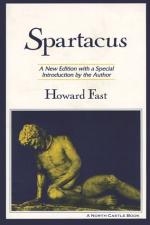|
This section contains 279 words (approx. 1 page at 300 words per page) |

|
Spartacus, the Thracian slave whose personal commitment and charisma unifies and leads the rebellion, is a prototype of the leader-martyr whose example illustrates humanity's timeless yearning for freedom. Varinia, his female counterpart, matches him in heroism and strength of commitment.
Compared to Christ in his emphasis on love and brotherhood, his power to secure belief and renew hope, his suffering and death, Spartacus also demonstrates a childlike pure-heartedness and innocence. His personal warmth, loyalty, and patience are reflected in his rebellion, undertaken in the name of love rather than hatred or revenge.
The qualities Spartacus and his slave followers exhibit are those of common humanity itself in its persistence and endurance in struggle. Although Spartacus is a leader, he is not the traditional "great man." The protagonists of Spartacus are the people themselves, shaping history in their persistent movement toward a more meaningful existence.
The slaves' antagonists are...
|
This section contains 279 words (approx. 1 page at 300 words per page) |

|



